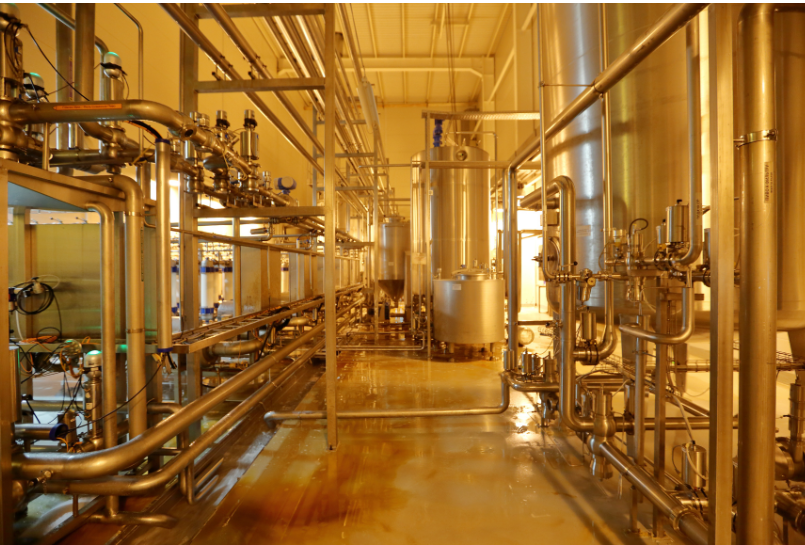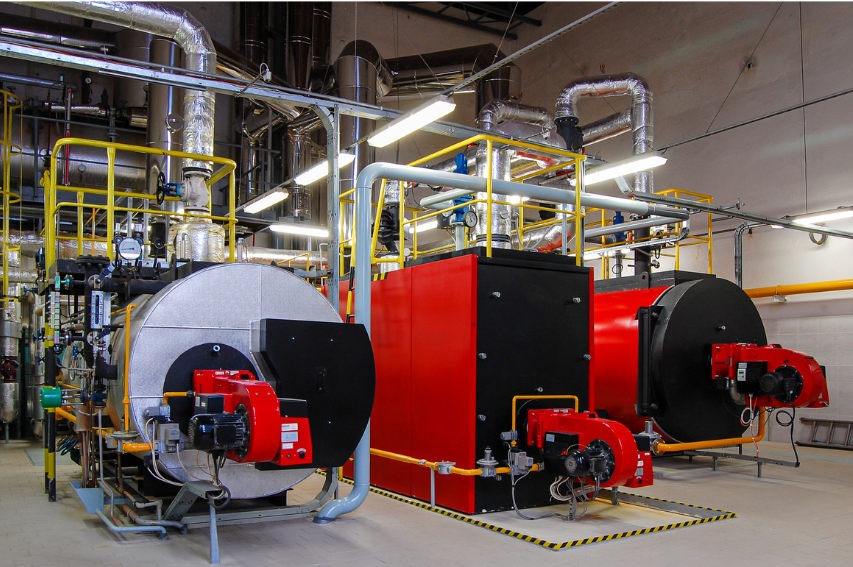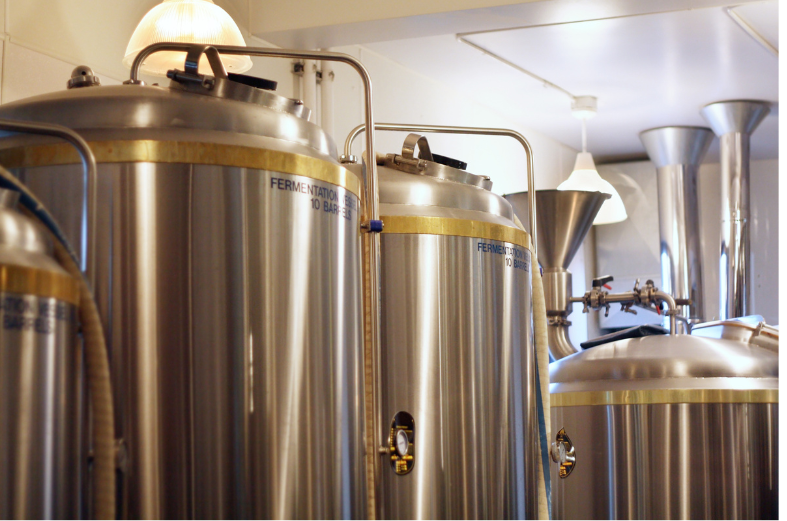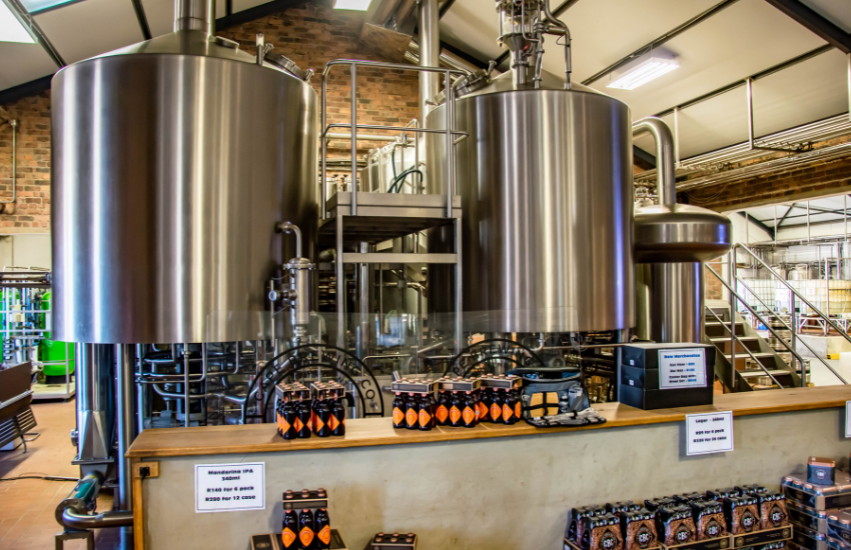
Boilers are a vital piece of equipment for any brewery. They provide the heat necessary for the brewing process, from heating the water to steeping the grains to boiling the wort. There are many different types of boilers available, each with its own advantages and disadvantages.
- Steam boilers are the most common type of boiler used in breweries. They produce steam, which can be used to heat the water and grains, and to sterilize equipment. Steam boilers are efficient and can produce a lot of heat, but they can also be expensive to purchase and operate.
- Watertube boilers are another type of boiler that is sometimes used in breweries. They are more efficient than steam boilers, but they are also more expensive. Watertube boilers are a good choice for breweries that need to produce a lot of steam, but they may not be the best option for smaller breweries.
- Firetube boilers are the least common type of boiler used in breweries. They are less efficient than steam boilers or watertube boilers, but they are also less expensive. Firetube boilers may be a good option for small breweries that do not need to produce a lot of steam.
When choosing a boiler for a brewery, it is important to consider the size of the brewery, the amount of heat that is needed, and the budget. It is also important to choose a boiler that is made from materials that are resistant to corrosion, as breweries use chemicals that can be harmful to metal.
In addition to providing heat, boilers can also be used to generate electricity. This can help to reduce the overall energy costs of a brewery.
Boiler maintenance is important to ensure that they operate safely and efficiently. Boilers should be inspected and cleaned regularly, and any repairs should be made promptly.
By choosing the right boiler and following proper maintenance procedures, brewers can ensure that their boilers operate safely and efficiently, and that they help to produce high-quality beer.
Brewing Excellence: The Role of Boilers in Breweries
In the world of craft beer, where flavors dance on the palates of beer enthusiasts, there is a hidden hero working diligently behind the scenes. Boilers, often unseen and unsung, play a vital role in the brewing process, ensuring that every sip of that frothy pint is infused with perfection. From providing steam for brewing operations to maintaining precise temperatures, boilers are the beating heart that powers the creativity and craftsmanship of breweries.
Breweries are no longer mere factories churning out mass-produced beer; they have become cultural hubs, where the art and science of brewing converge. And at the heart of this creative process lies the steam boiler. Boilers are the unsung heroes that quietly provide the necessary heat required to transform grain, hops, water, and yeast into the delectable liquid that beer enthusiasts know and love.
Boilers, in their simplest form, are closed vessels that generate heat and produce steam or hot water. These powerful units are the backbone of many industrial operations, and breweries are no exception. They serve a multitude of functions in the brewing process, playing an indispensable role in achieving consistency, quality, and efficiency.
Brewing is a delicate process that demands precision, and boilers provide the means to maintain the necessary temperatures throughout the various stages. From mashing, where hot water is mixed with malted grains to extract sugars, to the boiling stage where hops are added to the mixture, the right temperature control is paramount. Boilers ensure that each step of the brewing process is executed flawlessly, enabling brewers to achieve the desired flavors, aromas, and character in their creations.

The use of steam, a byproduct of boiler operations, is particularly crucial in breweries. Steam plays a vital role in several aspects, including heating and sterilizing equipment, sanitizing bottles and kegs, and providing a consistent source of energy for various brewing processes. The versatility of steam makes it an invaluable asset to breweries, enhancing efficiency and ensuring stringent cleanliness standards.
Furthermore, boilers enable breweries to recover and reuse heat, making them highly efficient systems. Heat exchangers within the boilers capture the excess heat produced during brewing, such as the hot water used in mashing, and transfer it to other areas of the brewing process that require heating. This innovative heat recovery system not only saves energy but also reduces operating costs, making boilers an environmentally friendly and economically viable choice for breweries.
The unsung heroes of the brewing industry, boilers, are the backbone that powers the creativity and craftsmanship of breweries. From providing the necessary heat and steam for brewing operations to maintaining precise temperatures, boilers play a vital role in ensuring consistent, high-quality beer production. They not only optimize efficiency but also contribute to sustainability efforts by recovering and reusing heat. So, the next time you raise a glass of your favorite craft beer, take a moment to appreciate the silent workhorse that made it possible – the boiler.
Breweries and the Power of Boilers
Breweries, with their bustling fermentation tanks, aromatic hop additions, and the joyful clinking of glasses, are the epitome of craftsmanship and artistry in the world of beer. Behind the scenes of these vibrant establishments, an unsung hero quietly ensures that the alchemy of brewing takes place flawlessly – the steam boiler. Boilers, with their ability to generate heat and provide steam, are the lifeblood of breweries, enabling the production of exceptional brews and the creation of unforgettable beer experiences.
Boilers form the foundation of brewing operations, serving as the dependable workhorses that transform raw ingredients into liquid gold. At the heart of their functionality lies the generation of steam, a critical component in various brewing processes. Steam powers kettles and vats, providing the necessary heat for mashing, boiling, and fermenting. Whether it’s the infusion of malted grains or the precise boiling of the wort, boilers ensure that the brewing process is executed with precision and consistency.

The demands of brewing require boilers to handle intense heat, and their installations are tailored to withstand the rigorous conditions. Industrial-grade boilers designed for breweries are equipped with advanced features to meet the specific needs of the brewing industry. These features include precise temperature controls, automated systems, and safety mechanisms to ensure optimal performance and protect the integrity of the brewing process.
Boilers in breweries are not just about heat generation; they are also instrumental in maintaining cleanliness and sanitization. Cleanliness is of paramount importance in brewing, as any contamination can result in off-flavors and compromised quality. Boilers provide the means for sterilizing brewing equipment, cleaning kegs and bottles, and ensuring a hygienic environment throughout the brewery. The steam produced by boilers is a powerful tool for sanitization, as it effectively eliminates bacteria and other microorganisms, guaranteeing the integrity of the final product.
Additionally, boilers are essential for the energy efficiency and sustainability of breweries. With the rising focus on environmental responsibility, breweries are embracing innovative solutions to reduce their carbon footprint. Boilers equipped with heat recovery systems enable breweries to capture and repurpose excess heat generated during brewing operations. This recovered heat can be redirected to preheat water or power other parts of the brewing process, resulting in reduced energy consumption and cost savings. By maximizing efficiency and minimizing waste, breweries that prioritize sustainable practices can create a positive impact on both the environment and their bottom line.
Boilers are the unsung heroes that power the brewing industry. From their role in generating steam for heat-intensive brewing operations to their contributions to cleanliness and sustainability, boilers are indispensable installations in breweries. They provide the necessary heat and sanitization required for the brewing process, while also enabling energy-efficient practices through heat recovery systems. So, the next time you enjoy a pint of your favorite craft beer at a brewery, raise your glass to the steam boiler silently working behind the scenes, making every sip a testament to the mastery of brewing.

Empowering Brewers with Steam Boilers
Brewers, the creative minds and skilled artisans behind the brews that tantalize our taste buds, rely on a myriad of tools and technologies to bring their visions to life. Among these indispensable tools is the steam boiler, a stalwart companion in the brewing process that empowers brewers in commercial breweries to achieve excellence in their craft. Boilers, with their ability to generate steam and provide consistent heat, serve as invaluable allies, ensuring that brewers have the means to turn their artistic vision into a reality.
In commercial breweries, where the scale of production is amplified, the role of boilers becomes even more critical. The demands of brewing larger quantities of beer require a reliable and efficient heat source, and steam boilers rise to the occasion. These robust units deliver the necessary steam and heat to meet the rigorous demands of the commercial brewing process, providing brewers with the control and consistency they need to produce batches of exceptional quality.
Brewers in commercial breweries rely on steam boilers for a multitude of brewing operations. From the mashing and lautering stages, where grains are steeped in hot water to extract sugars, to the boiling and whirlpooling stages, where hops are added and flavors are infused, precise temperature control is paramount. Boilers equipped with advanced controls and automation systems allow brewers to maintain specific temperatures throughout the brewing process, ensuring optimal enzymatic activity, flavor extraction, and consistency in every batch.
Moreover, steam boilers play a crucial role in fermentation and cellaring, where temperature control is essential to achieving the desired flavors and characteristics of the final product. Brewers can utilize steam to maintain the ideal conditions for yeast fermentation, providing the microorganisms with the optimum environment to convert sugars into alcohol and produce the unique flavors and aromas that define each beer style. Boilers also facilitate precise temperature control during the conditioning and maturation stages, ensuring that the beer attains its desired flavor profile before packaging.
Commercial breweries, with their larger production capacities, require boilers that are designed to handle the higher demands of the process. Industrial-grade steam boilers offer the necessary capacity, efficiency, and reliability to meet the needs of commercial brewing operations. These boilers are built to withstand the rigors of continuous operation, delivering the steam and heat required to keep the brewing process running smoothly and efficiently, allowing brewers to focus on their craft without interruption.
In conclusion, steam boilers are the trusted companions of brewers in commercial breweries, providing them with the power and precision needed to create exceptional brews. From enabling precise temperature control during the various stages of brewing to facilitating fermentation and conditioning, boilers are essential tools that empower brewers to turn their artistic visions into reality. With their capacity, efficiency, and reliability, steam boilers ensure that the commercial brewing process operates seamlessly, allowing brewers to focus on what they do best – crafting extraordinary beers that delight beer enthusiasts around the world.

Harnessing the Power of Steam in Breweries
Steam, an invisible force of energy and a cornerstone of industrial applications, finds a special place of prominence in the brewing industry. In breweries, where heat is a crucial element in the alchemy of beer production, steam emerges as a versatile ally that drives efficiency and excellence. Through the collaboration of boilers and steam, breweries are able to unlock a world of possibilities, where precise temperature control, equipment sterilization, and energy optimization converge to create exceptional brews.
Boilers, the workhorses of breweries, generate the steam that fuels the brewing process. As the boilers produce heat, water is transformed into steam, a high-temperature, pressurized vapor with exceptional energy-carrying capabilities. This steam becomes the lifeblood of breweries, providing the necessary heat to mashing, boiling, and fermentation operations.
One of the critical roles steam plays in breweries is temperature control. In the mashing process, where malted grains are mixed with hot water, steam ensures precise and consistent temperatures, facilitating the extraction of sugars from the grains. Boilers deliver steam to the heating elements of mash tuns, enabling brewers to maintain the ideal temperature ranges for enzymatic activity and sugar conversion.
During the boiling stage, steam continues to work its magic by transferring heat to the wort, the liquid extracted from mashing. Steam jackets in brew kettles allow for efficient heat distribution, ensuring that the wort reaches the necessary boiling point and providing an environment conducive to flavor extraction from hops and sterilization of the liquid.
Beyond temperature control, steam also serves a vital role in equipment sterilization, a critical aspect of ensuring the cleanliness and quality of the final product. Boilers supply steam to the cleaning and sterilization processes, allowing brewers to sanitize brewing vessels, pipes, and other equipment effectively. The high temperature of steam effectively eliminates bacteria, yeasts, and other microorganisms, minimizing the risk of contamination and maintaining the integrity of the brewing process.
Furthermore, steam installations in breweries contribute to energy optimization and sustainability efforts. Boilers equipped with heat recovery systems capture and reuse excess heat generated during the brewing process. This recovered heat can be redirected to preheat water, provide hot water for cleaning purposes, or power other energy-intensive brewing operations. By harnessing the potential of steam and maximizing energy efficiency, breweries can reduce their environmental impact and operational costs, aligning their practices with sustainable principles.
In conclusion, steam stands as a powerful and versatile ally in the world of brewing. Collaborating with boilers, steam facilitates precise temperature control during mashing, boiling, and fermentation, ensuring consistency and quality in every batch. Its role in equipment sterilization safeguards the integrity of the brewing process, while its potential for energy optimization aligns with sustainable brewing practices. Breweries continue to harness the power of steam, unlocking new horizons in the art and science of brewing, and delivering exceptional brews to beer enthusiasts worldwide.

The Boiler: Engine of Efficiency for Brewery Operations
In the realm of brewery operations, where precision and consistency reign supreme, the boiler takes center stage as a vital piece of equipment that drives efficiency and performance. Designed specifically for the unique demands of the brewing industry, boilers play an indispensable role in powering commercial breweries, ensuring seamless operation and the production of exceptional brews. From service to purchase, understanding the significance of boilers in the brewery ecosystem is essential for brewers and brewery owners alike.
The choice of boiler for a brewery is a decision of great importance, as it directly impacts the quality, efficiency, and overall success of brewing operations. Commercial boilers are specifically designed to meet the rigorous demands of brewery processes, combining power, reliability, and advanced features tailored to the brewing industry’s needs.
Service is a crucial aspect to consider when it comes to boilers in breweries. Choosing a reputable boiler service provider ensures reliable performance and peace of mind for brewers. Routine maintenance, inspections, and timely repairs are essential to keep the boiler operating optimally. Engaging with a professional service provider with experience in brewery boilers helps ensure that potential issues are addressed promptly, minimizing downtime and ensuring consistent production.
When purchasing a boiler for a brewery, several factors come into play. Capacity is one key consideration, as the boiler needs to match the brewing volume requirements. Efficiency is another crucial aspect, as it directly affects energy consumption and operating costs. Selecting a boiler with high energy efficiency ratings can lead to substantial savings over time. Additionally, advanced controls and automation systems provide brewers with precise temperature control, improving brewing consistency and reducing the risk of off-flavors.
Commercial boilers designed for breweries often feature specialized components and construction to accommodate the unique requirements of the brewing process. For example, boilers may incorporate steam jackets or direct-fired systems to provide heat during mashing and boiling stages. They may also have integrated heat recovery systems, allowing the capture and reuse of excess heat for various brewing operations. Safety features such as pressure relief valves and automatic shut-off systems ensure the well-being of the brewing facility and its personnel.
Investing in a well-designed boiler can yield significant benefits for breweries. These include improved energy efficiency, precise temperature control, enhanced productivity, and the ability to maintain stringent quality standards. A reliable and efficient boiler system not only optimizes brewing operations but also contributes to the overall success and reputation of the brewery, ultimately delighting beer enthusiasts with exceptional brews.
The boiler serves as the engine of efficiency for brewery operations, ensuring consistent heat supply and driving the brewing process forward. When considering the purchase of a boiler, breweries must carefully assess their requirements, prioritize service and maintenance, and select a boiler specifically designed for the brewing industry. By embracing the power of a well-designed boiler, breweries can unlock the potential for exceptional performance, energy efficiency, and the production of outstanding brews that captivate beer lovers around the world.
